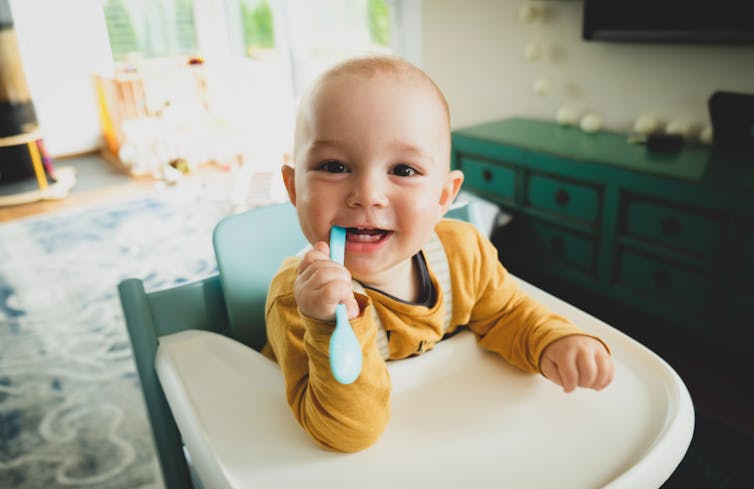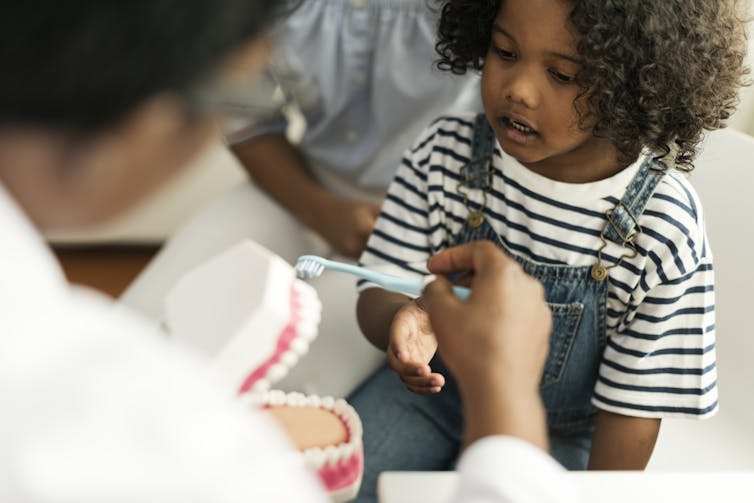Source: The Conversation (Au and NZ) – By Arosha Weerakoon, Lecturer, General Dentist & PhD Candidate, The University of Queensland
Baby teeth, or milk teeth, act like lighthouses to guide the adult ones to their correct destination. A baby tooth will become wobbly and fall out because the adult tooth that follows pushes through to break down the roots of the baby tooth.
To lose baby teeth, particularly the first one, is a rite of passage for children. And while most baby teeth do fall out, some kids won’t lose all their baby teeth.
Sometimes, the adult teeth simply don’t form. In an average class, one or two students, or 6% of children, will not form at least one adult tooth (this doesn’t include those with missing wisdom teeth). A missing adult tooth will often mean the baby tooth remains in place into adulthood.
For this and other reasons, it’s important to look after your child’s baby teeth. Healthy baby teeth are paramount to children’s health and well-being both in the present and into adulthood.
Kids get cavities too
Just like in adult teeth, baby teeth can develop cavities (holes). Factors including cavity-causing bacteria in the mouth, regular consumption of sugary drinks and snacks, and not brushing well can make cavities more likely.Untreated cavities can grow to affect or even kill the nerves and blood vessels inside the tooth. If this happens, your child can suffer from severe toothache and infection. These are among the most common preventable reasons for children to require dental treatment under general anaesthetic.
In some instances, it may be necessary to remove a baby tooth if it’s infected or has a very large cavity. This can potentially cause overcrowding.
If a baby tooth is lost before the adult successor is ready, the teeth on either side drift into the space. Lacking space, the adult tooth may eventually come through in the wrong place. In such cases, your child is more likely to need braces.
Read more: Curious Kids: why do we lose our baby teeth?
Dental problems can lead to bigger problems
Left untreated, infected baby teeth can affect your child’s health and well-being.
Children with healthy smiles fare better at school relative to those who suffer with dental problems. Children who experience dental pain may lose sleep, have difficulty concentrating and participating in class, and miss school altogether.
Poor dental health also affects children’s physical development. Children with sore teeth may skip meals or eat less, which can affect their nutrition and growth.
We also know cavities in baby teeth are associated with an increased risk of suffering from the same issues into adulthood.

Some signs your child may have dental problems
A child will describe and experience a toothache differently to adults, but there are a few signs you can look out for. Your child may:
-
complain of a sharp poking pain, an annoying, sore or itchy tooth, or even an earache
-
avoid hot, cold, sweet or hard, chewy foods
-
take longer than usual to finish a meal
-
complain about food getting stuck in their teeth
-
have difficulty brushing their teeth
-
have trouble falling asleep or wake up during the night more often than usual
-
be too tired to participate in class
-
perform poorly at school
-
experience difficulty socialising and speaking
-
be more irritable or grumpy than usual.
Read more: Do I need to floss my teeth?
The good news is, once children’s dental issues are diagnosed, most if not all problems can be fixed or managed.
Visiting the dentist
You should book a dental check-up when your child’s first tooth comes through, or by their first birthday — whichever comes first.
After that, schedule check-ups regularly, depending on how frequently your dentist recommends. While your child’s teeth may be OK, frequent visits will help them get comfortable with the dentist, and allow for any issues to be dealt with early.

It’s no secret some children (and even adults) find the prospect of visiting the dentist daunting. It’s important parents of young children establish the dentist in a positive light.
These tips can help you and your child prepare for their first and subsequent visits:
-
use positive, child-friendly terms when referring to the dentist, such as “the tooth fairy’s friend”
-
avoid emotionally laden words such as “needle”, which may frighten children
-
avoid threatening children with consequences for poor behaviour
-
avoid sharing poor dental experiences
-
make the visit fun by role playing going to the dentist at home beforehand, or likening the visit to a play date.
Read more: Child tooth decay is on the rise, but few are brushing their teeth enough or seeing the dentist
Dental care at home
Alongside regular dental checks, it’s important to set up good habits with your children around looking after and brushing their teeth:
-
talk about teeth and why they’re important
-
help your children brush their teeth with a soft, age-appropriate toothbrush
-
let your children have fun (for example, use toothbrushes that feature their favourite characters).
Generally, Australian guidelines recommend you use fluoridated toothpaste by the time the child reaches 18 months (before this, you can just use water). But you can discuss which toothpaste is appropriate for your child at their next dental appointment.
Parents who have dental issues may worry their child will suffer the same fate. But as a parent or guardian, you can influence your child’s dental habits and attitudes to help them now and into their future.
– ref. Yes, baby teeth fall out. But they’re still important — here’s how to help your kids look after them – https://theconversation.com/yes-baby-teeth-fall-out-but-theyre-still-important-heres-how-to-help-your-kids-look-after-them-148190







